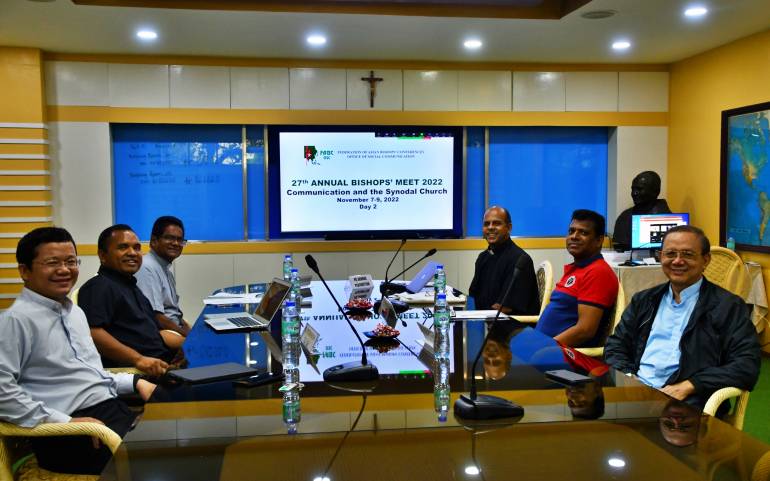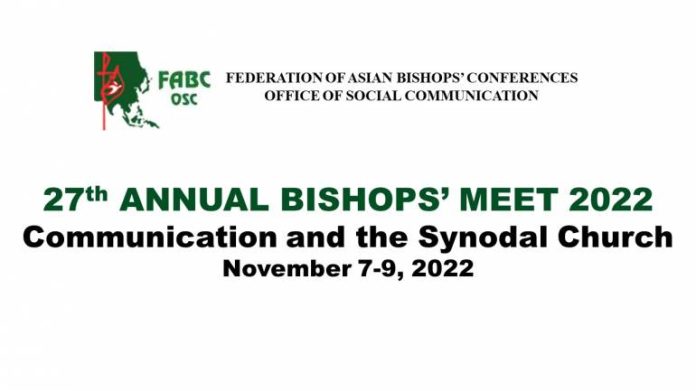Communication is “central and fundamental” to the life of a synodal Church as it remains a “constitutive dimension of Church ministries.”
In its most profound sense, communication or the “giving of self in love” is also the “soul of the apostolate.”
This was affirmed by participants of the 27th annual “FABC-OSC Bishops’ Meet,” the exclusive meeting of FABC bishops in-charge and secretaries for social communication first held in 1996.
This year, the Bishops’ Meet convened in a hyflex setting where online and onsite participants both met through a video conferencing platform.
Experts from the Holy See’s Dicastery for Social Communication, Singapore, India, the Philippines, the Catholic Media Council, and Radio Veritas Asia joined in the discussions.
The theme, “Communication and the Synodal Church,” aimed at identifying the “impact of (1) synodality and the communication ministry, as well as (2) the role of communication in a synodal Church.”
In the Final Statement, the Bishops said that “by her essence, the Church is communication, reflecting the Holy Trinity’s communion and communication.”
The bishops also refer to a synodal Church as communicating in ways that “foster, enable, and facilitate (communion in) community life.”
The “communicating” synodal Church they said reflects the participation and inclusivity of a “synodos” (Greek) or the “journeying together of the pilgrim people of God.”
The bishops also said that the Church’s participatory communication “recognizes the dignity and equality of all the baptized and strives to foster and promote co-responsibility at all levels.”
In her evangelizing mission, Church communication “must be imbued with the gifts of the Holy Spirit” as well as “listens with the ear of the heart.” See Pope Francis’ Message for the 56th World Communication Day 2022.
In the end, the bishops said that the Church’s communication ministry “must strive to bear witness to Christ’s communication expressed in his self-emptying (koinonia) as well as service (diakonia).”
These recommendations were structured according to the theme “Communion, Participation, and Mission,” which is the theme adopted for the synodal process and Synod Bishops on Synodality first initiated in October 2021 and culminating in October 2024.
The Bishops’ Meet convenor is FABC-OSC or the Federation of Asian Bishops’ Conferences – Office of Social Communication.
Here is the full text of the Final Statement of the 27th FABC-OSC Bishops’ Meet 2022:
Federation of Asian Bishops’ Conferences –Office of Social Communication (FABC-OSC)
27th Annual FABC-OSC Bishops’ Meet
Theme: “Communication and the Synodal Church”
FINAL CONSIDERATIONS
We, the bishops -chairmen and secretaries of episcopal commissions for Social Communication in FABC member conferences gathered in a hyflex onsite and online meeting from November 6 to 10, 2022 for the 27th annual FABC-OSC Bishops’ Meet.
The conference theme “Communication and the Synodal Church” explored the impact of (1) synodality and the communication ministry, and (2) the role of communication in a synodal Church.
Resource persons from the Holy See, Singapore, Sri Lanka, India, and the Philippines explored the theme from various perspectives. Representatives from the Holy See’s Dicastery for Social Communication and the Secretariat of the Synod, the Catholic Media Council (CAMECO), and Radio Veritas Asia (RVA) were also present and joined the deliberations.
***
Pope Francis’ call in October 2021 for synodality and a synodal church has initiated a process of reflection at all levels of the Church on ways of living the spirit of synodos (Greek) and its equivalent concilium (Latin), which essentially beckons the pilgrim people of God to journey together on a common path.
The process continues worldwide to unfold and lay down mechanisms for the formation of a synodal Church where the faithful journey together, in communion with one another recognizing their dignity and equality in Christ through their baptism, in active participation and mission towards a common goal.
Our deliberations thus focused on the nuances of the theme of the three-year synodal process from 2021 to 2024 with its focus on “Communion, Participation, and Mission.”
In light of the FABC’s own emphasis enunciated more than three decades ago on “A New Way of Being Church in Asia” (FABC V, Bandung, 1990), we acknowledge the fact that communication is a central and fundamental element in the church and in the synodal process. Communication is viewed as something beyond the listening dimension, but as a constitutive element in the new way of being Church, her evangelizing mission and in fostering intercultural and interreligious dialogue and people’s participation.
We also reiterate that:
The Church, by her essence, is communication, reflecting the communication and communion of the Holy Trinity. “She was founded to continue the communication of Jesus Christ in word and deed” (FABC-OSC Bishops’ Meet 1996). Communication is, therefore, “the soul of the apostolate” of the Church (BISCOM III, 2001).
The New Way of Communicating Church in Asia is also marked by communion and participation. The Church is called to bear witness through dialogue and through her prophetic mission in her communication (FABC-OSC Bishops’ Meet 1997).
However, we recognize that our efforts towards synodality call for efforts of communicating God’s loving self-communication, fostering co-responsibility, networking, inclusivity, and cooperation as well as social transformation across religions, cultures, and socio-economic statuses. These realities lead us to recognize the following:
ORIENTATIONS
1. The lack of a free and genuine communication culture is observed in some Asian societies and communities.
2. Media praxis of the Church, including the engagement with digital media, only seldom resonates the voice of the voiceless and marginalized.
3. Communication/ media education programs are found to be largely instrumentalist and inadequate in our parishes and dioceses.
4. Communication is not sufficiently recognized as an essential element of the mission of the Church. In most local churches it remains at the periphery of the Church’s evangelizing, catechetical mission and other ministries.
5. Communication is rarely understood as a constitutive dimension of what it means to be Church and much less to be a “synodal Church.”
RECOMMENDATIONS
In light of the foregoing, we hereby recommend the following:
1. If the Church is to truly reflect the Trinitarian communion, her communication must foster, enable, and facilitate community life that is participatory as well as inclusive.
- The Office of Social Communication (OSC) in FABC-member conferences must function as an enabler and bridge, a strategist and leader, and effectively communicate within and outside the Church.
- The OSC must inspire other ministries and the faithful in general to “communicate in the most profound sense” (Communio et Progressio, 1971, 11), and in consonance with the vision of synodality.
- Those entrusted with the responsibility of communication ministry in the Church must foster the spirituality of communication (FABC-OSC Bishops’ Meet 2001) and synodality.
- If the Church is to be genuinely participatory, her communication must recognize the dignity and equality of all the baptized and strive to foster and promote co-responsibility at all levels.
2.1 Training and formation in communication and synodality must be offered to all the faithful, more particularly to catechists, religious educators, and pastors in general.
2.2 The OSC and its partners must exercise due diligence in disseminating adequate information in both understandable as well as appropriate forms.
3. If the Church is to be truly missionary, she must be imbued with the gifts of the Holy Spirit in discovering the potential of communication for its evangelizing mission.
3.1 Everyone in the Church must strive to create and maintain an environment that fosters “listening to one another with the ear of the heart” (Pope Francis Message for World Communication Day 2022).
3.2 All communication enterprises of the Church, including the FABC-owned Radio Veritas Asia (RVA) — Asia’s missionary voice, and the FABC Communication institute, Veritas Asia Institute for Social Communication (VAISCOM) must be engaged in fostering and promoting communion, participation as well as the evangelizing mission of the church.
3.3 Communication must promote and strengthen the evangelizing mission of the church by responding to the needs and situations of the time. All Christian communication ministries must strive to bear witness to Christ’s communication expressed in his self-emptying and service (koinonia and diakonia).

Originally published at https://www.rvasia.org/church-asia/communication-central-and-fundamental-synodal-church
###



